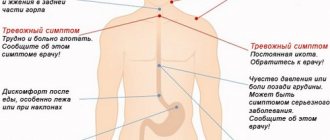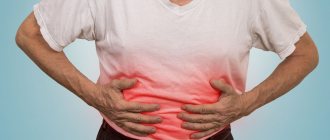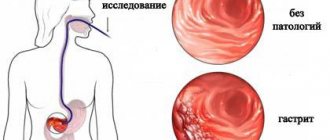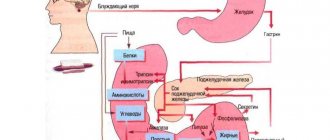Causes of stomach discomfort and constant gas formation
When consuming an increased amount of food, the walls of the stomach are stretched. Gastric juice, in turn, does not have time to process food, which leads to stagnation in the gastrointestinal tract. Patients may complain of heaviness in the intestines, belching and flatulence appear.
Factors that cause the above-described symptoms in the gastrointestinal tract:
- binge eating;
- abuse of fatty and fried foods;
- rapid swallowing of food;
- frequent snacking;
- constant consumption of sweet, carbonated drinks.
Heaviness in the gastrointestinal tract on an empty stomach can occur:
- during pregnancy, the uterus compresses the internal organs, causing discomfort;
- in a state of stress, hydrochloric acid is produced, which negatively affects the intestinal mucosa;
- bad habits such as alcohol and smoking have a negative impact on the functioning of all organs, including the gastrointestinal tract;
- taking antibiotics and certain medications.
If you have indigestion, you need to follow these rules:
- do not eat fatty, fried foods and processed foods;
- do not eat too hot or cold food;
- to refuse from bad habits;
- eat right and follow a special diet;
- give up all carbonated drinks.
The accumulation of gases in the gastrointestinal tract (flatulence) occurs due to dysfunctional digestion, which may be accompanied by belching. Typically, such symptoms do not require special treatment. But if flatulence, belching and bloating appear more and more often and are accompanied by diarrhea, you should consult a specialist as soon as possible. The reason for frequent belching is conversation during meals, haste in eating, eating on the go, as a result of which air gets inside along with food.
Belching after eating
Belching is not normal and appears as a result of:
- Eating large amounts of food quickly (large food pieces and swallowed air irritate the wall of the esophagus and stomach, causing regurgitation of food and air bubbles).
- Talking while eating.
- Frequently drinking carbonated drinks, which also cause bloating.
- Sudden bending forward after eating.
In order to get rid of it, it is necessary to exclude all the provoking factors listed above and take prokinetics (Domrid) for 2-3 weeks.
List and brief description of gastrointestinal diseases
The appearance of belching along with flatulence and heaviness often signals serious abnormalities in the human body.
- Gastritis. When it occurs, increased or insufficient secretion of gastric juice occurs, the mucous membrane becomes inflamed. Often the cause of the disease is the following factors: alcoholism and smoking, poor diet, constant stress.
- Stomach ulcer. A chronic disease in which abscesses form on the gastric mucosa. This disease is characterized by severity, heartburn, vomiting, severe pain and can lead to complications.
- Dysbacteriosis. Violation of the beneficial composition of the intestinal microflora, resulting in a malfunction of the stomach. In this case, the patient experiences frequent rumbling, bloating, and changes in stool.
- Pancreatitis. Inflammation of the pancreas occurs. The following symptoms are characteristic of pancreatitis: nausea, vomiting, severe pain in the left or right hypochondrium, general weakness.
- Cholecystitis. Inflammation of the walls of the gallbladder and disruption of its functions. This organ takes part in the digestion of food. During the period of exacerbation of chronic cholecystitis, symptoms such as belching, vomiting of bile, abnormal bowel movements, bitter taste in the mouth, and pain on the right side occur.
Gastroesophageal reflux
Another pathological condition characterized by heaviness in the stomach.
In addition, there are symptoms such as:
- heartburn, nausea;
- belching sour or freshly eaten food;
- bloating, rumbling in the stomach, less often - flatulence (gas).
They are caused by dysfunction of the sphincter, resulting in the reflux of gastric juice into the esophagus. The acidic environment damages the mucous membrane of the esophagus, which is why the patient often experiences heartburn and pain in the epigastric zone.
To treat the patient, antacid tablets that reduce gastric acidity, prokinetics and diet therapy are prescribed. Intestinal dysbiosis
Heaviness in the stomach can be caused by an imbalance of microflora in the intestines. At the initial stage, the patient begins to experience severe rumbling, bloating and gases. Next, problems arise with stool, which can be too liquid, smelly, or manifest itself in the form of constipation.
Such an imbalance most often occurs after long-term use of antibiotics, radiation therapy, or acute intestinal infection.
Special preparations containing bifidobacteria and lactobacilli, as well as conditionally pathogenic flora (probiotics), help reduce gas formation and normalize stool. They are prescribed for a long course after a positive stool test for dysbiosis.
Excessive rumbling and gases are eliminated with the help of a special diet, including a large amount of vitamins and microelements, fiber.
In addition to therapeutic therapy based on medication, experts recommend engaging in gentle physical activity. Light morning exercise or a short run in the fresh air will eliminate congestion in the digestive tube and have a beneficial effect on blood circulation.
Diagnosis of diseases
Firstly, it is necessary to establish the cause of the unpleasant symptoms, because they may indicate the presence of serious problems in the gastrointestinal tract. Secondly, if the examination does not reveal any pathologies, you need to first understand your lifestyle.
Eliminate all bad habits, change your diet, start eating a healthy diet and chew your food slowly. It is also not recommended to overeat at night and the last meal should be two or three hours before bedtime.
In what cases should you seek help from a doctor? If symptoms such as heaviness in the stomach, belching of air, constant gases and flatulence bother you for long days, you should consult a specialist. He will explain what it could be. During the examination, the gastroenterologist will refer you to the examinations he has prescribed. It could be:
- general and biochemical blood test,
- fibrogastroscopy,
- Ultrasound of the gastrointestinal tract.
You should learn to control your emotions and not succumb to stressful situations, as they will negatively affect not only the functioning of the heart and blood vessels, but also the functioning of the entire intestine.
Functional dyspepsia
Functional dyspepsia (FD) is understood as the periodic occurrence of complaints of:
- heartburn (“burning” pain behind the sternum), frequent belching;
- nausea, much less often – single vomiting;
- aching pain in the projection of the stomach;
- bloating due to increased gas formation;
- bowel dysfunction in the form of constipation.
With normal functioning of the gastrointestinal tract, the food mass from the stomach cavity gradually moves further into the duodenum. Having gone through all the stages of digestion in the small and large intestines, the chyme (bolus of food) is safely excreted. With dyspepsia, this process slows down significantly, causing pain, abdominal discomfort and bloating.
An unpleasant aspect of medical practice is that patients seek help from a doctor already with serious disorders. They try to treat relatively minor ailments on their own, guided by advertisements they see.
Having turned to a pharmacist for help, patients often only eliminate the obvious symptoms without trying to find the true reasons that caused the gastrointestinal tract to malfunction.
What can be recommended for people suffering from dyspepsia? Symptoms such as pain, bloating, severe gas formation are gradually eliminated with an integrated approach:
- For some time, antacids are used to protect the gastric mucosa (Phosphalugel, Almagel);
- pain syndrome can be relieved with antispasmodics of the No-shpa type;
- a course of prokinetics (Domperidone, Duspatalin) is also indicated;
- it is important to normalize nutrition (the frequency of food consumption should be at least 5 times a day; exclude spicy and fatty foods, smoked foods, and confectionery products from the diet);
- limit intake of alcoholic beverages, quit smoking.
More details about the causes, types, clinical picture and treatment of functional dyspepsia can be found in the article.
Medicines for the treatment of heaviness and belching of the gastrointestinal tract
Treatment with medications is prescribed only by a doctor. Pharmacies today sell various drugs and medications to eliminate and treat problems with the digestive tract.
The following medications are considered the most famous and effective:
- Panzinorm. Used for dysfunction of the pancreas, as well as for flatulence and dyspepsia.
- Smecta. This medication is taken for various problems in the gastrointestinal tract, gastritis, ulcers, etc.
- Mezim. Designed to eliminate belching, heaviness and pain. The course of treatment is prescribed by a doctor.
- Festal. Helps with discomfort, heaviness, eliminates gases, constipation, improves digestion.
- Rennie. Prescribed for those who have high stomach acidity, heartburn and belching.
- Omez. Reduces the production of hydrochloric acid in the stomach and has antiulcer properties.
- Motilium. This drug is very popular among the population. It is taken for flatulence, nausea, vomiting, cholecystitis, and heartburn. It perfectly eliminates the feeling of heaviness in the stomach after eating.
When taking one of the above medications, you must first read the instructions. The choice of a method of dealing with gastrointestinal problems should first be carried out according to the principle of least harm to the body. First of all, normalize your lifestyle and diet, and if after this there is no improvement, resort to choosing suitable medications.
Treatment
If heaviness and belching appear occasionally and do not bother you much, then you don’t have to worry. In cases where these symptoms bother you after every meal, you need to visit a doctor: some kind of malfunction has occurred in the body.
A specialist will be able to prescribe treatment only after a complete examination. The main treatment is aimed at improving stomach function and reducing the level of hydrochloric acid in gastric juice.
It is important to know! Treatment can be done either with medication or with folk remedies. But it is advisable to consult a specialist before starting to treat yourself.
It is recommended to cook dishes by steaming, grilling, or oven. It is allowed to eat boiled vegetables and meat. Also, to improve digestion, you should include dairy products and cereals in your diet.
During the consultation, the doctor will prescribe a comprehensive treatment for diseases of the gastrointestinal tract. It is based on proper nutrition: it is imperative to exclude from the diet those foods that can cause irritation of the gastric mucosa.
If treatment requires taking medications, then they must be taken according to the instructions specified by the specialist.
Treatment of diseases of the intestines and stomach usually consists of a set of prescriptions made by a doctor. However, for the methods to be effective, they must be followed completely.
At the appointment, the doctor will be able to answer the question of why heartburn and heaviness in the stomach appeared. It is worth understanding that the reasons for the appearance of each person may be individual.
Interesting! How not to swallow air while eating - causes of aerophagia
Dyspeptic disorders
The disease is often called “lazy stomach.” Recently, pathology has been manifesting itself more and more often, manifesting itself as severe disorders in the gastrointestinal tract.
The process is accompanied by severe discomfort, pain in the abdomen, and belching.
Already at the beginning of the meal, sharp saturation and severe distension of the stomach develop. In most cases, there is functional dyspepsia, that is, functional malfunctions of the stomach.
This syndrome is called “stomach laziness”, because the organ stops actively contracting and moving food fully. Food stagnates and causes severe discomfort.
Episodes of stagnation occur quite often. They can be provoked by eating heavy food and alcohol. The etiology of the disease has not yet been clearly established.
One thing is clear, pathology mainly develops in fast food lovers, smokers, and alcohol drinkers.
Exercises for flatulence
Doctors warn those who like to lie down after a heavy lunch: you can “lie down” with a lot of intestinal problems, including flatulence. And those who want to improve their well-being are advised to perform the following exercises daily for flatulence.
Lie on your back, bend your legs at the knees, raise them above the floor and “pedal” an imaginary bicycle - 20 seconds three times with breaks of a few seconds. Remain in a lying position on your back, bend your knees and place them shoulder-width apart, extend your arms straight along your body. Resting on your feet and shoulder blades, lift your pelvis from the floor, remain in this position for a count of 1-2-3-4, and then slowly lower to the starting position. Number of repetitions – 10. Lie on your stomach; straight legs at the knees and feet pressed against each other; The arms bent at the elbows are located along the chest. Raise your body from the floor, leaning on the palms of your straightened arms, bend your back, throwing your head back. Remain in this position for 5 seconds, then smoothly lower to the starting position. Number of repetitions - 10. Stand up straight, place your feet shoulder-width apart, raise your bent arms, clasped together, behind your head. As you inhale, bend forward (without bending your knees), and as you exhale, straighten with a bend back. Number of repetitions – 8-12. Starting position is the same as in the previous exercise, but with your hands on your waist. On the count of 1, raise your arms up; on the count of 2-3, perform a springy bend forward with your fingers touching the floor. On the count of 4 - return to the original position. Number of repetitions – 8-10.
Description of the phenomenon
As you know, the lungs are far from the only internal human organ filled with air. And there is air in the stomach, and normally its volume there is quite large (up to 1.5 liters). This is due to the fact that the stomach is not hermetically sealed from the outside world. The presence of air inside the stomach ensures optimal pressure inside this organ.
The air contained in the stomach can be removed from it in several ways. Firstly, through the esophagus (which is where belching occurs). Some air may pass through the intestines and exit through the anus. And part of it is absorbed through the intestinal walls.
In what cases do discomfort occur?
After eating, belching of air and heaviness in the stomach develop against the background of disturbances in the normal functioning of the organs of the digestive system. The exit of air masses from the stomach through the oral cavity occurs as a result of swallowing air during eating. Excessive air entering the stomach occurs when:
- talking while eating;
- overeating;
- frequent consumption of carbonated drinks;
- hasty consumption of food during stressful situations;
- consuming significant amounts of alcoholic beverages;
- rapid chewing process, subsequently food enters the stomach in an insufficiently crushed form.
A sedentary and inactive lifestyle also contributes to the deterioration of the digestive tract.
Every person experiences belching from time to time. In a healthy body, swallowing a small amount of air during food intake is not a pathology, but a necessary practice to maintain pressure inside the peritoneal cavity. In this case, the return air release does not have any unpleasant sensations or smell. If symptoms begin to occur quite often and are accompanied by such signs as a feeling of bitterness or acidity, heartburn, foul odor from the mouth, pain in the upper abdomen, this may be the first signal of serious problems with the functioning of the gastrointestinal tract that require therapy.
Heaviness in the stomach after eating and belching can become symptoms of impaired digestion of food, especially fatty and fried foods, fast foods, pickles, smoked and spicy foods.
Causes of belching air
To understand why this phenomenon occurs, it is necessary to consider the principle of operation of the digestive system. When food enters the body, it passes through the esophagus and enters the stomach. If there is a lot of food, then some of the air from the stomach comes out. This phenomenon is not pathological and indicates normal motility of the gastrointestinal tract. Therefore, if a person, after a hearty lunch, experiences several episodes of belching with odorless air, then this is not a cause for concern.
Advice from gastroenterologists
It is important to constantly follow useful recommendations. You need to eat little by little and intermittently. You should not drink food right away. It's better to do this before eating.
It is useful to take walks after meals and exercise twice a week.
This kind of damage to digestive structures depends on the person himself. There is a lot of evidence of this.
So, sometimes it’s enough just to change the culture of your eating behavior and improving your well-being will not take long.
Prevention
The main prevention to prevent heaviness in the stomach and belching after eating is to maintain a healthy lifestyle.
- Proper and regular nutrition. It is necessary to eat often, but in small portions, and the last meal should not be later than 2 hours before bedtime. It is imperative to exclude junk food from your diet.
- Calm mental state. To do this, you need to get enough sleep, walk in the fresh air, receive only positive emotions, and get plenty of rest.
- Active lifestyle. Morning exercises and regular exercise have a strong impact on digestion. Since all organs responsible for digestion are made up of muscles, exercise will have a positive effect on their functioning.
Additional Information! In addition to a healthy lifestyle, to prevent diseases, you should regularly visit a gastroenterologist and have an ultrasound scan. Your doctor may also prescribe tests that will help determine the development of diseases at an early stage.
Traditional therapy methods
There are a huge number of different ways to treat stomach problems using traditional medicines. Despite all their safety, such treatment should be used only after medical consultation.
The selection of medications directly depends on the etiology of the process. So, in the presence of high acidity and chronic gastritis, it is useful to drink tea based on mint, lemon balm and blackberry branches.
Rowan is used for gastritis disorders and ulcerative disorders. Flax seeds are indicated for intense, persistent belching. Cranberry juice is indicated for low stomach acidity.











